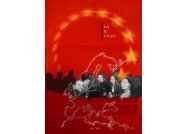turkish-greek civic dialogue - AEGEE Europe
turkish-greek civic dialogue - AEGEE Europe
turkish-greek civic dialogue - AEGEE Europe
You also want an ePaper? Increase the reach of your titles
YUMPU automatically turns print PDFs into web optimized ePapers that Google loves.
58<br />
in. As a last activity, the workshop leader directed the participants to work on<br />
projects about subjects they prefer. Two groups were formed to this end to<br />
work on the project’s aims, involvers, contents, partners and posters. At the<br />
end, two festival projects were formed and were presented to the participants<br />
of ‘Rebuilding Communication’ conference. During the workshop, participants<br />
also made gestures and sounds by using their body to express themselves and<br />
they had the chance to learn more about the other participants.<br />
WORKSHOP PARTICIPANTS OF<br />
YOUTH’S ROLE IN TURKISH-GREEK DIALOGUE<br />
PROUDLY PRESENT:<br />
LET’S COOK FOR<br />
THE GOOD<br />
A Four-Day Festival which will involve all the NGO’s. There will be workshops<br />
about the Greek and Turkish recipes and there will be discussions about the<br />
history of these foods. As a result there will be a book with all the recipes of<br />
the foods, the money that we will gain from the book will use for the help of<br />
the poor regions of Greece and Turkey. In general we want to bring together<br />
the two countries, to interact on an issue that is very common for them, to<br />
learn about the evolution of the foods after many years and to use a common<br />
issue for a good aim: to help the poor regions!<br />
WAVES’ RELATIONSHIP<br />
“Our team aimed to plan exchanges and a festival”. 1st Exchange: For 1 week<br />
Greek participants would stay at a small town in Turkey, 2 nd Exchange: For 1<br />
week Turkish participants would stay at a small town in Greece. 1 Festival,<br />
10 week performances on a boat. The participants would start from their<br />
countries on boats to meet in the middle of AEGEAN sea, navigate across the<br />
AEGEAN, and then go back again to their countries. During the exchanges,<br />
they would learn about the culture of the “other”. Lessons on Turkish or Greek<br />
dances, music, food. On the boat, they would perform everything they learnt<br />
and additionally professional artists would present some performances.<br />
3. THE ROLE OF EDUCATION IN<br />
TURKISH-GREEK RELATIONS<br />
....................................................... Recep Boztemur, Panagiotis Kontolemos<br />
Workshop Leaders<br />
This workshop focused on the concept of education and the workshop<br />
participants stimulated discussions on the role of education in Turkish-<br />
Greek relations and <strong>dialogue</strong>, contribution of education in the formation of<br />
stereotypes, the way history is taught in schools and the way it should be<br />
taught, the content of history textbooks, how national policies use history as a<br />
tool, and how to eliminate prejudices orienting from this issue. The workshop<br />
was supported by the statistics presented by the academics. The workshop<br />
participants decided to establish a mailing list to further discuss about their<br />
proposals towards projects advocating objective history writing.<br />
“This workshop on the role of education in Turkish- Greek Civic Dialogue mainly<br />
concentrated on how education might be an ideological tool for national policies<br />
and measures to be taken to diminish the stereotypes formed by national<br />
education policies. On the first day of the workshop, we had a motivating<br />
discussion moderated by <strong>AEGEE</strong>-Rodos member and archeology student<br />
Panagiotis Kontolemos and Turkish- Greek Civic Dialogue project manager Burcu<br />
Becermen from <strong>AEGEE</strong>-Ankara, on the role of education in the framework of<br />
Turkish- Greek relations. There were <strong>AEGEE</strong> members from Athens, Rhodes,<br />
Eskişehir, Izmir, Adana and Ankara branches, participants from Turkish History<br />
Foundation, AFDAG (Anatolian Folk Dance Group), students from Bosphorus and<br />
Istanbul Universities and history teaching staff from Sakarya University.”<br />
MAIN POINTS OF DISCUSSION<br />
- Why we need education and the ideological content of education<br />
- How the content of textbooks effect the formation of stereotypes<br />
through years in each country<br />
- How history is taught and should be taught in Greece and Turkey<br />
- How history is constructed and used as a tool by societies and<br />
ideologies<br />
Rebuilding Communication Association des Etats Généraux des Etudiants de L’<strong>Europe</strong>







